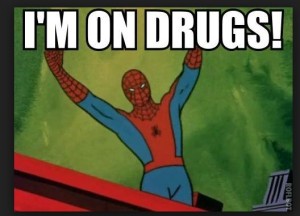I believe that art can, and sometimes even should, reflect life. When I read speculative short fiction, there’s always a part of me that’s looking for what I can learn from it. I mean, I like a good hand-spun yarn as much as anyone – reading for fun is still my end goal – but I also want to peel back a story’s fantastical layers, hold it up under the microscope, and see what it reflects about our world. Especially if it reveals the, ah, less flattering parts.
To me, the best fantasy and science fiction stories aren’t only influenced by modern society but have something to say about it. They leave an impression, ripples in their wake. That’s why in Prose Dive I’d like to share with you short stories that do more than tickle your literary receptors; I want to share with you stories you can ruminate over. Each installment of Prose Dive will explore two main ideas:
- Why a story has value as a piece of literature
Why a story has modern cultural significance
Basically, I’m spotlighting short fiction stories that are as important as they are entertaining. Because I, like you I hope, like to have my cultural cake and eat it, too.
Up first is Sam J. Miller’s “When Your Child Strays From God,” printed in the July edition of Clarkesworld magazine. Like the rest of this month’s issue, it’s about a new beginning – the establishment of a new order – spurred on by strange, new experiences. Bethesda Wilde, our heroine, is a devout Christian mother and pastor’s wife who must embark on a hallucinogenic journey to find her son, Timmy, who has gone missing, both in the physical and spiritual sense. It’s snarky, zany, and has a lot of heart.
Disclaimer: Spoilers beyond this point. Please take necessary precautions and read the story before proceeding.
The Setting
“When Your Child Turns From God” is set in a world that resembles our own. But it’s also a world that has mind-sharing eye drops made from crystallized, hallucinogenic spiderwebs. So, there’s that. It could take place in really any small, rural town, complete with the petty machinations that are the side effects of a small population and stagnant socio-political views. This setting is pretty rare in sci-fi, meaning we get to see fictionalized perspectives on a number of topical themes and concepts from real life: conservative worldviews, Christian ideology, homosexuality, drug abuse – hell, even insights into a minor case of helicopter parenting.
The science fiction aspect isn’t as science fiction-y as most stories go, but it is a very modern thing to talk about. If you can’t see the real-world influence of this, and the conflict it creates in causing someone as rigid as Beth to take drugs, you must be, and forgive me for saying so, smoking something. You know, something from the real world of real drugs.

Anyway.
Speculative fiction with a modern setting saves us from having to unearth our own meaning through hardpacked layers of allegory. References to 60 Minutes, Dateline, and YouTube shouldn’t kick you out of the narrative; the point of the story isn’t to show us a completely unique world. The contemporary setting just works, and it lets us see our world plainly, including the ugly parts. And if this sounds like a breeding ground for meaningful character conflict, you’d be ab-so-lutely right.
The Characters
At the story’s beginning, main character Beth is defined as the following:
- a Christian
- a mom
- and a wife.
The result? She’s sharp, conservative, and very quick to judge. Maybe you can relate to that, maybe not. Or more likely, maybe you know her from another work of fiction. That’s the beauty of boiling down a character to their base elements: If you can’t relate to a character, you can at least see the symbol or idea they represent. Beth’s symbol is that of the archetypal pastor’s wife: she keeps God and family first, and fulfills her role as an opponent of gays, liberal thinkers, and other types currently shaking up today’s 21st century status quo.
If you hang out where all the kids are these days, you don’t have to look far to see how fashionable it’s become to criticize the sometimes overzealous nature of Christians/Christian parents. But that’s precisely what makes Beth such a fascinating narrator. She’s interesting because her archetype, like the setting, is underrepresented in speculative fiction. Her narration draws us into her world, and it’s her perspective as a mom, as a Christian, that I find both familiar and fresh. Familiar because the committed parent is a recognizable archetype, and fresh because she is representing the Christian faith, whose role as the religious oppressor has been subverted in many of today’s online social circles. And yet her snarky outlook on her small-town life lets us know that we’re meant to sympathize with her and her ordeal.
Maybe you feel that’s dishonest. But fiction is nothing but well-crafted lies, meant to trick you into caring for characters you would traditionally have no business rooting for. Author Miller just happens to craft these lies into a strong main character you can’t help but like.
But good characterization would be nothing without a few character flaws.You’re familiar with the helicopter parent? It’s a common and excruciatingly modern concern for parents and kids – whether they are helicopters themselves or whether they are being, er, helicoptered upon. Beth exhibits the same overbearing qualities as mothers of the rotor-bladed persuasion do – she cares for her kid, and she isn’t above invading his privacy to do so. But she has the decency to feel guilty when she goes into his room, which both endears us to her and makes us wary of her at the same time. And despite her rigid Christian ideals, she has a practical streak – she decides the only way she can find her son is to take a potentially lethal hallucinogenic. This display of proactivity both moves the story forward and satisfies that romantic ideal of a heroic character who must do “whatever it takes” to save the day.
While sneaking into a teenager’s room to take some drugs isn’t exactly the stuff of legend, Beth’s true test as a strong protagonist comes with her interactions with other characters. The few there are are skillfully handcrafted by Miller to serve as either obstacles or end goals for Beth. Timmy and his reunification are the end goals, while That Whore Susan (Beth’s words, not mine) is an apparent obstacle. Carolina Bugtuttle, who is mentioned several times in the story’s beginning, may as well have the surname Bugbear, for we never actually meet her. But again, Beth’s strong opinion toward Carolina and other characters rounds her out, softens her rough, unlikable bits. The fact that this conservative Christian mom can care so much about her son but can have not-so-nice thoughts about her rival wins us to her side. It adds an essential human element to the oft-demonized archetype she stands for. Over the course of the story, Miller builds Beth to be someone we root for, despite what she represents in our world.
The Plot
So what happens in the story that has meaning for us reader-folk? The first that comes to mind is the story’s premise: a well-to-do mom does drugs for the sake of her son. That’s practically a Huffington Post headline right there, but it does illustrate the lengths at which someone could conceivably go for someone they love. Specifically regarding Beth and her love for Timmy, those lengths are extra long because he is gay and she is a Christian, and that discovery brings about her cathartic change.
Oh, you can be Christian and still support your gay son, like how the end of “When Your Child Strays From God” shakes out. But this fictional story lets us see Beth resist that outcome up until the very end, when she realizes she can change for the sake of the person her son truly is, rather than the person she perceives him to be.
Freedom of love is as topical as it gets these days. This story takes a snapshot of a scenario very close to what could actually happen, adds a bit of magical spice, and gives us a happy ending. What’s the point of a story if an author can’t envision an ideal outcome on a controversial topic like this, crafting it the way he or she wants? Homosexuality, gay rights – these are as much a part of our society as anything. Miller’s story isn’t telling you to pick a side, I think, and that’s not what this column is doing either; that this story can remind us of this very real part of our world is the consummate point.
The Takeaway
Short fiction seems made for our fast-paced lifestyle. You can read a self-contained, satisfying story on your lunch break. But short fiction is also proving, and has been proving for years, that it is an ideal platform for pushing the envelope. It’s the frontier of fiction, where anyone can show up so long as they’ve got the guns, and can stake their claim to make a difference in the fictional marketplace. Sam J. Miller’s “When Your Child Strays From God” is the kind of story that proves this in every way. If you were looking for a story to get your mouse wheel a-scrollin’, both from a story basis and intellectually stimulating perspective, Miller’s was hopefully the kind that greased your finger-axles.
I think whatever can be learned about our short lives here on this mortal plane is worth a look. Consuming entertainment the NitWitty way means we should be able to identify these stories’ inherent themes and see the real-life applications they’re derived from. What you do with them is entirely up to you; all the balls have been in your courts the whole time. But if you want to see what else you can learn from cutting-edge short fiction, tune in to the next installment of Prose Dive.








